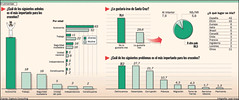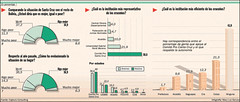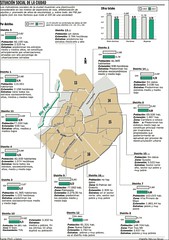Statistical snapshot of Santa Cruz
10.04.2005Technorati tags: Bolivia Santa Cruz
Bolivia's parliament is starting to work towards a possible compromise on seat apportionment that'd ensure the elections still go on 4 December. So I thought I'd take a moment to go back a few days to 24 September, the Santa Cruz regional holiday. Because El Deber published an interesting special edition on the 195th Anniversary of Santa Cruz.
The issue included a discussion on camba dialect from regional historians. They even describe the teaching of standard ("Andean") Spanish as a form of "violence" against school children. There's another article arguing that Santa Cruz (for most of its history) grew alone, ignored by the central government — and how this shaped the cruceño political culture. Other articles, of course, focus on the flore, fauna, lifestyle, art, history, etc of the region. Your standard newspaper special fare.

![]() Most interesting, however, was the popular opinion survey (conducted by Captura Consulting) presented across various articles. Among the survey's strongest findings, was the strong among those surveyed for political autonomy (56%) as the "greatest desire" for cruceños. That response beat work/employment (18%), security/crime (16%), national unity (5%). But when asked which of the following problems was the most urgent for cruceños, the breakdown was: delincuency (27.7%), unemployment (27.7%), corruption (21.7%), poverty (10.7%), migration (4.3%).
Most interesting, however, was the popular opinion survey (conducted by Captura Consulting) presented across various articles. Among the survey's strongest findings, was the strong among those surveyed for political autonomy (56%) as the "greatest desire" for cruceños. That response beat work/employment (18%), security/crime (16%), national unity (5%). But when asked which of the following problems was the most urgent for cruceños, the breakdown was: delincuency (27.7%), unemployment (27.7%), corruption (21.7%), poverty (10.7%), migration (4.3%).

![]() When asked how they thought Santa Cruz compared to the rest of the nation, 34.9% of respondents answered "somewhat better" (another 8.6% responded "much better"), while 37.2% responded "the same". When asked whether their household had improved or not from last year, 36.9% of respondents answered "somewhat better" (another 6.3% "much better"), while 35.5% responded "the same". This translates to almost 80% who think Santa Cruz is about the same or better than the rest of the nation, and that their personal households have stayed the same or improved over the previous year.
When asked how they thought Santa Cruz compared to the rest of the nation, 34.9% of respondents answered "somewhat better" (another 8.6% responded "much better"), while 37.2% responded "the same". When asked whether their household had improved or not from last year, 36.9% of respondents answered "somewhat better" (another 6.3% "much better"), while 35.5% responded "the same". This translates to almost 80% who think Santa Cruz is about the same or better than the rest of the nation, and that their personal households have stayed the same or improved over the previous year.

![]() Surprisingly, this general sense of cruceño optimism contradicts the drop in Human Development Index figures between 1992 & 2001. Still, the department of Santa Cruz has the highest HDI figures in the country. And there's speculation that the regional economy improved between 2003-2004, after the 2001 survey.
Surprisingly, this general sense of cruceño optimism contradicts the drop in Human Development Index figures between 1992 & 2001. Still, the department of Santa Cruz has the highest HDI figures in the country. And there's speculation that the regional economy improved between 2003-2004, after the 2001 survey.
Perhaps the most interesting finding, was when asking what institution best represented cruceños. A solid majority of 58.8% chose the Comité Cívico Pro Santa Cruz. Second place was the public university (Universidad Autonoma Gabriel René Moreno) w/ 21.9%. The municial government ranked third w/ only 10.0%. Like the question about autonomy, support for the Comité Cívico was slightly higher among "adults" (30-45 year-olds) than "young people" (18-24 year-olds).
Other interesting generational differences: Young people trusted the COB less (2.5%) than adults (4.9%); they also trusted the university less (21.2%) than adults (22.4%); but they supported the municipal government (15.3%) almost three times the rate of adults (5.6%).
Fortunately, El Deber publishes some of the methodological information (scroll down). The distinction between "adults" & "young people" was based on two focus group studies. The survey was based on 300 phone interviews of 12 minutes each between 15-17 September. The sample included respondents from the lower-middle class (income $400-500), "typical" middle class, and upper classes. The survey claims 95% reliability and a +/- 5% margin of error.
And while we're looking at newspaper special editions. Here's one from 28 August 2005 (a Sunday) that gives a "two decades later" look at D.S.21060. That decree stopped hyperinflation, dismantled several (inefficient) government-owned industries, and established Bolivia's neoliberal economic model. The issue includes views from supporters & critics alike.
Posted by Miguel at 01:03 PM
Comments
I wonder whether that really is a representative sample for all of Santa Cruz. The sample does not include lower class participants, if I am reading it correctly.
The one thing that bugs me about the attitude of some in the region, is the omission of the fact that the region's development - particularly the agro sector- owes quite a bit to the Central gov't policies, including land grants and channelling foreign aid to the region in past decades.
Posted by: Boli-Nica at October 5, 2005 02:58 PM
I agree, a phone survey might not give a good sample of lower class attitudes. At least the newspaper's bit on "methodology" mentions that only "lower middle class" & above were sampled.
And I also agree that very frequently the cruceño imagination forgets the state's role in regional development. But it's also interesting to note the popular attitudes about this, which reflect how citizens view themselves & their relationship to their broader political community (and how they veote) than just the objective facts (which are, of course, also important).
Posted by: Miguel ![[TypeKey Profile Page]](http://www.centellas.org/miguel/nav-commenters.gif) at October 5, 2005 03:50 PM
at October 5, 2005 03:50 PM
I do agree that it has validity insofar as it measures the attitudes towards specific institutions and regions, by an important segment of Camba opinion.
There is a long-term resentment towards the Alitplano. Some of it boils down to straight-out-racism, which is the common explanation given by some. But there is an undeniable frustration towards La Paz political class, that has been simmering for decades. Examples include the failure to build a railroad, the MNR's cracking down on Camba movements in the 50's, and the Gulf nationalization in the late 60's which affected Santa Cruz directly. Then you have the whole idea (justified largely) of Santa Cruz being the "motor" of Bolivia's economy. In many ways it parallels what many "Paulistas" had towards the rest of Brazil, and Coastal Ecuadorians towards the "Sierra".
Posted by: Boli-Nica at October 5, 2005 06:17 PM
wow! enjoyed reading all that info on Santa Cruz. I appreciate you time spent updating. It's amazing, Miguel, that you have the ability to gather and synthesize all of this (but I guess that's what a PHD is for. I don't think a PHD in education is quite the same. great writing!
Also pennies - I have a huge basket of pennies at school I use for bingo games and such. Maybe there might just be a retirement bonus in that basket!
Posted by: beverly at October 5, 2005 10:07 PM